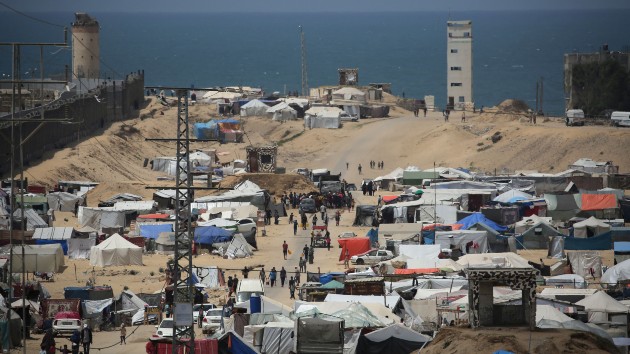(WASHINGTON) — The Biden administration’s plan to begin operating a pier next month off the Gaza coast to enable millions of humanitarian aid packages a day still faces several unresolved logistical issues, including who will provide security to the United Nations aid workers willing to distribute the supplies, officials say.
The ongoing discussions are pushing the project down to the wire, which is scheduled to be up and running by early May.
“The safety and security of our humanitarian partners is the most important thing,” Sonali Korde, assistant administer to the State Department’s U.S. Agency for International Development, told reporters this week during a briefing on humanitarian efforts in Gaza.
“It’s absolutely vital, and they need to feel safe and secure,” Korde said.
President Joe Biden ordered the military in March to build the pier after experts warned Gaza was on the brink of famine.
U.S. military ships have already arrived in the Mediterranean, carrying the heavy equipment to construct the giant floating pier and causeway. Pentagon Press Secretary Maj. Gen. Pat Ryder said Tuesday those vessels are “standing by,” ready to begin construction when ordered.
Another major hurdle was cleared in recent days when USAID announced the U.N.’s World Food Program (WFP) agreed to distribute the aid from the pier so long as certain conditions are met.
Cooperation from the U.N. aid group was key to the project moving ahead because Biden has mandated that no U.S. troops or private American contractors operate from the ground in Gaza.
But while the U.S. military can build the pier relatively quickly — much as it did in 2010 off the coast of Haiti following an earthquake — officials have spent weeks wrangling over how to operate a massive humanitarian hub in the middle of a war zone.
According to one U.N. official, there have been lengthy discussions on the pier’s precise location and where it might be most effective. It’s also unclear how long the pier will need to be used.
On security, the U.N. official, who spoke on condition of anonymity in order to describe internal deliberations, said the U.N. wants to rely on its own security to protect World Food Program staff, not the Israeli military. The primary concern, the person said, was to maintain neutrality in the conflict.
The Israel Defense Forces currently manage checkpoints into Gaza and provide security for designated “humanitarian corridors” that enable U.N. trucks to travel north.
“Given the catastrophic hunger situation in Gaza, WFP is open to exploring any opportunity to safely reach people in desperate need,” the WFP wrote in a statement. But any final agreement must set conditions “that allow for safe, sustained, and scaled up assistance to reach people in need,” the WFP added.
More than 200 humanitarian aid workers have been killed in Gaza and the West Bank since the beginning of the war on Oct. 7. Among those killed were seven aid workers with the World Central Kitchen in a strike on April 1 that Israeli forces said was a grave mistake.
USAID’s Korde acknowledged the security concerns in a press briefing Tuesday.
“We’re very cognizant … that the U.N. needs to maintain its principles of neutrality and independence and access throughout Gaza,” Korde said.
“We’re trying to abide by those principles and make sure that everyone involved has the safety and security they need,” she added.
Since the Israeli strike that killed seven aid workers, and under pressure from Biden, Israel has dramatically increased the flow of humanitarian supplies into Gaza, allowing on average 200 aid trucks a day, according to the State Department.
U.S. officials said this week that more needs to be done to improve the distribution of aid, provide potable water, and get lifesaving medicine to civilians. Administration officials also say they are pressing Israel to be clearer about which items included in humanitarian packages will be prohibited so that shipments don’t get held up by Israeli security.
David Satterfield, the State Department’s special envoy for Middle East Humanitarian Issues, told reporters at the briefing that the U.S. has made clear to Israel that the military pier and maritime aid route needs to be done in addition to — not in lieu of — keeping ground checkpoints open to aid trucks.
“There is no question that the most efficient and effective ways to deliver assistance is by as many land corridors as possible,” Satterfield said.
When asked if the Israel Defense Forces would agree to the U.N. providing its own security, a spokesperson for the Israeli military declined to comment.
Both the Pentagon and USAID say that even with discussions underway, the project is still on track to become operational in early May.
“This is a complex operation that requires coordination between many partners, and our conversations are ongoing,” a USAID spokesperson wrote in a statement.
ABC News’ Phoebe Natanson, Dana Savir, Desiree Adib, Matt Seyler, and Kirit Radia contributed to this report.
Copyright © 2024, ABC Audio. All rights reserved.





